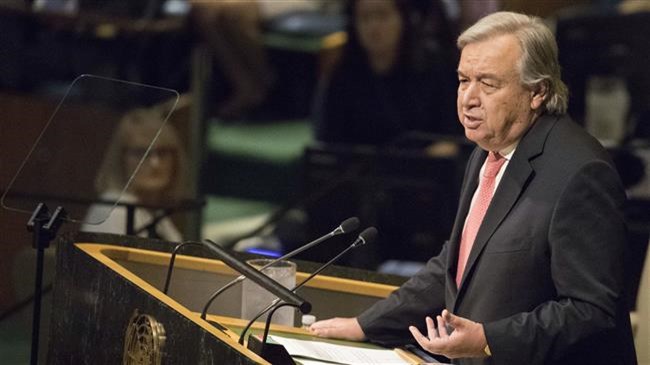
UN chief urges Myanmar to halt military campaign against Rohingya
September 19, 2017 - UN Secretary-General Antonio Guterres has called on Myanmar to put an end to its military campaign against Rohingya Muslims, just hours after the country’s de facto leader Aung San Suu Kyi failed to allay international concerns over the ongoing ethnic cleansing in Myanmar.
Addressing the inauguration ceremony of the UN General Assembly in New York on Tuesday, Guterres said he "took note" of Suu Kyi's promise to abide by the recommendations of a report by former UN chief Kofi Annan that underlined the need for citizenship for the Rohingyas.
"But let me be clear. The authorities in Myanmar must end the military operations, and allow unhindered humanitarian access,” Guterres pointed out.
"We are all shocked by the dramatic escalation of sectarian tensions in Myanmar's Rakhine state," Guterres told the general assembly.
On Tuesday, Suu Kyi addressed the nation for the first time since August 25, when a fresh upsurge in violence subjected the Rohingya in Muslim villages across the western state of Rakhine to mass killings, torture, rape and arson attacks and forced more than 417,000 to flee their homeland.
Read more:
Myanmar’s leader defended how her government is dealing with the massive human rights violations committed against Rakhine-based Rohingya Muslims, which the UN says amount to “ethnic cleansing.” The Nobel Peace Prize Laureate fell short of singling out the military in the globally-condemned violence, which has triggered a massive exodus of Muslim refugees to Bangladesh.
Myanmar's second Vice President, Henry van Thio, is scheduled to address the UN General Assembly on Wednesday after Suu Kyi refused to attend this year's international gathering.
The leader of the Asian country’s civilian government said Myanmar does not fear international scrutiny and is committed to finding a sustainable solution to the situation in Rakhine. Suu Kyi’s silence has provoked immense international criticism in recent weeks, especially after dismissing reports of ethnic violence in Rakhine the Myanmar military and majority Buddhists against the persecuted Muslim community.
In her speech, Suu Kyi even refused to use the word Rohingya to refer to members of the minority group, naming them only once while making mention of the Arakan Rohingya Salvation Army, a group that purportedly fights to defend the rights of the minority group. She claimed that peaceful conditions were disturbed only after armed groups had staged terrorist attacks on dozens of police outposts in August.
She claimed that Myanmar was ready to verify the national status of the Rohingya refugees who have fled violence in recent weeks. “We are prepared to start the verification process at any time," she suggested.
But the brutality against the Rohingyas has its roots in the very fact that Myanmar does not recognize them as citizens and has denied citizenship rights to 1.1 million members of the community for several decades, alleging they are Bengalis who have in the past migrated to the country from Bangladesh. The Rohingya were stripped of their citizenship in 1982 despite having lived in the country for generations.
Due to their status, the Rohingya are not free to travel and practice their religion, having little access to medical care, food or education.
Following the 30-minute rant, Amnesty International, which has been sharply criticizing Myanmar’s recent conduct in Rakhine, was quick to respond, saying the Nobel laureate and her government are only “burying their heads in the sand” in the face of the violence.
The government forces in Myanmar do not even spare the fleeing Rohingya refugees. Recent reports by Amnesty and Bangladeshi officials say the military plants landmines on the path of those trying to cross into Bangladesh, causing them to sustain serious wounds or lose their limbs.
